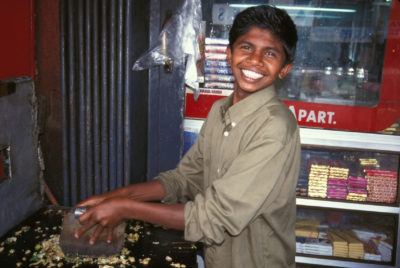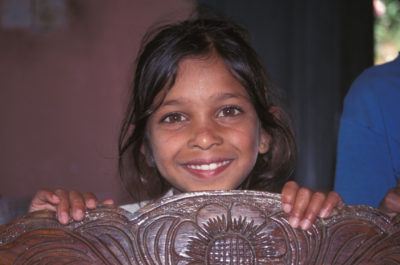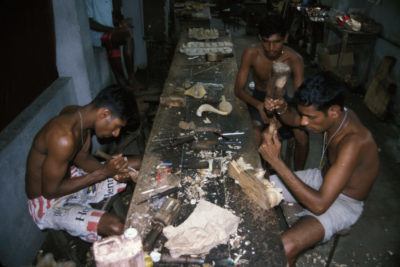by Bill Murray

Politics as the family business works out better for some than for others. Last year Turkish President Erdogan had to fire his son-in-law Finance Minister. And the Trumps, well … you know. But things are working out pretty well for the Rajapaksas of Sri Lanka.
The President is Gotabaya Rajapaksa, nickname “the terminator.” The Prime Minister is Mahinda Rajapaksa, his older brother. Basil Rajapaksa, “Mr. Ten Percent,” their younger brother, is a former MP. Their other brother Chamal, a former speaker of Parliament, is a cabinet minister, and Namal Rajapaksa, Mahindra’s son, is an MP and Minister of Sports, representing the next Rajapaksa generation.
When we left our story (Read part 1 here) it was six o’clock in the morning, election day 1999 in Nuwara Eliya, a highland tea-picking town south of Kandy, Sri Lanka. Two loudspeakers played the call to prayer, mounted atop a glass-enclosed Buddha statue just by the traffic circle. The sun hadn’t cleared the hills but it was set to be a glorious morning, birds and dew run riot.
At this hour, Nuwara Eliya served mostly as a regional bus station. People queued for rides and a few stores pushed open their doors. At a milk bar (that’s a name for convenience stores, here to New Zealand) I bought toothpaste and remarked how it would be a nice day. Dazzling smile: “It is election day, sir!”
People walked, made a day of walking, walking into town, walking to polling stations. They got time off from work to vote. Tyrone said all the drivers expected a curfew (they all stayed at a compound next to the hotel, like on African package safaris). When the announcement came, they’d go together to the police station in Nuwara Eliya town center and get travel permits for carrying foreigners.
When the sun beat down and the hills gleamed and blinded you clear out to the horizon, there was a cure for that. The St. Andrews Inn offered all the to-the-bone dankness of late winter on the River Tay. Just what you wanted in a tourist hotel.
Its snooker tables, they said, were a century old. The St Andrews Inn grew its own carrots, beets, beans, broccoli, cabbage, horse mint, peppermint, coriander and parsley. They were proud of their garden, where guests could pick their own salad. Except there was no sign of guests.
While we were inside clouds closed above a full blanket of mist that hung down and draped across Nuwara Eliya. Before you knew it the dripping sweat of Columbo, only 120 miles back up the road, was a distant memory.
We bought a mango and tiny peanuts. My wife Mirja liked them better than the big ones back home, the way Roma tomatoes are tastier than fat round factory-grown ones. The guy fashioned a bag from a folded sheet of newspaper and scooped it full for thirty rupees. Which is, roughly, free.
A beaming boy (photo up top), sleeves rolled onto his forearms, stood before a videotape and chocolate store chopping garlic and spring onions on an ancient stovetop. It smelled delicious.
This was a real vacation day, way out on a trip, not coming or going, no travel, no agenda, no problem. Chased inside by the dampness, we banged on the heater in our room in mid-afternoon until it showed life and I turned on the shortwave, as just now was NATO’s thirteenth night of bombing Serbia. In 1999, the internet hadn’t quite yet supplanted the shortwave, at least in Sri Lanka.
•••••
Chair won. The ruling alliance represented by a chair gained ground, losing seats only in Colombo and the suburbs. Tyrone told us the results but I already knew because a little animated chair did a little jig on morning TV. Later, the BBC World Service called it a muddle, no clear victor, no mandate for either side.
The vote: People’s Alliance 2,105,546, United National Party 1,979,546, making up 70 per cent of registered voters. “No deaths have been reported…. The majority of the complaints were of a minor nature, bordering on threats, abuse and cases of simple hurt….” as the paper put it.
There was some violence in Matale, north of Kandy, but the curfew the drivers had expected would last only from eleven at night to five a.m. Still, at a police checkpoint at the edge of Nuwara Eliya town, the cop wanted us to go way around the other way. Tyrone lied that he didn’t know that way.
Tyrone didn’t do bags. He’d call a bell boy. He’d let Mirja and me haul them. Whatever, he wouldn’t touch ‘em. He’d spend fifteen minutes guarding them in the lobby instead of loading them up.
But what a gorgeous day! Tyrone in his British driving cap, the air crisp and fresh, we set off at 7:30 sharp, down from the highlands, and drove five and a half hours to cover 160 kilometers. Five and a half hours, a hundred miles.
Mist filtered the sunlight way up in the hills around Lake Gregory as we drove alongside orchids grown for export, alongside the old British horse racing track on the east side of town, and then down toward Bandarawela.
Mirja had a cold, started a week before. What better way to chase it than an herbal massage at the reknowned Suwa Madhu Indigenous, Eight-fold Ayurvedic Treatment and Manufacturers of Herbal Medicine and Beauty Cream Institute of Sri Lanka, just on the far side of Bandarawela town?
While the institute did its magic I wandered down the street to a communal spring and watched babies washed by laughing kids, scarcely older, everybody splashing and playing in the pool. The oldest girl invited me home for tea. They placed a tiny cup in my lap and the whole family of eight watched me drink from it. I showed them postcards of home and they showed me their pride and joy, the oldest boy, away at the police academy, as photographed in his class picture.
Green double doors with a tassel of string instead of a door knob led to an anteroom that may have begun as the color of peach. The plaster had long ago cracked and smudged. Three framed photos, all askance, decorated the otherwise bare walls. Mama, in sandals and a print skirt, graying at the temples, sat in a high, straight-backed chair, her hands clasped in her lap, smiling, surrounded by her brood.
 The youngest, a precious brown-eyed beauty, took shy refuge behind a hand-carved chair, only her head and hands visible. I may have been a stranger, but she offered a ready, open smile.
The youngest, a precious brown-eyed beauty, took shy refuge behind a hand-carved chair, only her head and hands visible. I may have been a stranger, but she offered a ready, open smile.
Meanwhile the Suwa Madhu Institute seemed to do the trick. Mirja came out hair up, oily and grinning.
Now rolling across the flats bound for the coast, lushness from every vantage point, endless gardens of paradise. Buildings, painted over with ads, hawked Sunlight, Astra, Vim, Signal, Rinso and Lifebuoy household products, and “Curd & Hunny.”
In monastery towns monks climbed on and off the buses. There were branches of Peoples Bank – “The Bank with a Heart” – and here was Triple Star Services – “A New Meaning to Cleaning.” Once we found ourselves trapped for a while by the Chirpy Chip truck – “From the House of Uswatte.”
We passed a truck labeled on each side, simply, “Retort.”
Bikes hauling bananas plied the roadway, now alongside cactus and sawgrass. Marsh and wetland, salt pans, lagoons and windmills covered the Sri Lankan south.
We just beat a tour bus into the otherwise empty Oasis Hotel at a place called Hambantota. Walking into the lobby, Tyrone gleamed, “How do you like it?” We turned to look around and he said, “My father was project manager for this entire complex. But he died before grand opening.” We told him we liked it real well.
They played bad disco at lunch, and the waiters tried proper, formal serving techniques, barefoot. They smiled sweet as the day is long pouring Carlsbergs that foamed up, over and out of the glass.
Two fellows named Nandiga and Chaminda showed up in what once may have passed for a jeep. Here was our afternoon safari team, and away we went to look for elephants.
Nandiga wore a funny shirt with stripes and curlycues, and smoked cigarettes like French people do in movies, forefinger and thumb, as he hurtled us, one hand on the wheel, back down roads we’d crossed more carefully earlier in the day. At the park entrance, Chaminda moved from the front seat to stand upon the back benches, and took the canvas top off.
We bumped along near the shore, sometimes coming right alongside it, and saw more elephants than you’d think, six or seven, but they all looked cornered by the inevitable convergence of rapacious jeeps like ours. We came upon a pair and gave them distance as they watered themselves, nuzzled and played, but it still felt as though we were imposing.
Paul Bowles wrote about the same thing in the 1950s: “You feel as though you were in a tremendous zoo whose inmates had been placed there for your amusement. Perhaps it is because a few miles outside the sanctuary you see what look like the same buffaloes working placidly in the paddy-fields, and very similar elephants moving slowly along the roads, tinkling their bells….”
Elephants, iguanas, monkeys, but this safari was mainly about birds – over 20,000 in the park at any given time, Chaminda said. Migratory wild ducks from Siberia, sandpipers, jungle fowl, peacocks, peahens, gulls, plovers, terns, a few green parrots, egrets, pelicans, herons and storks. And one crocodile (Chaminda knew where to look).
Nandiga too. At 22, he’d already been working here nine years, a helper before he got his drivers license, then as a safari master. He drove like 20 year olds do the world over, but we made it home. The Yala Preserve wasn’t Africa but it was fun, and this safari only cost $26.50.
•••••
A hint of the absurd hung over all our Sri Lankan affairs. Barefoot servers decanted Carlsbergs like fine wine, holding the bottles at the bottom, towels draped across their forearms.
“When does the monsoon come?” I asked Tyrone. “End of April, sir.”
“Is it ever late?”
“It is always late, sir.”
Paul Bowles told a story: he was “stripped naked by customs inspectors while their assistants fingered the seams of my garments. In the first instance they told me I was suspected of being an international spy. ‘But spying for whom?’ I insisted. ‘Spying for international.’”
•••••
A sunny dawn, but by mid-morning a silver cast covered the sky and storm clouds scudded up in the west. Surf crashed against the shore so determinedly that it chased off the stilt fishermen at Talpe, whose stilts swayed bare in the waves.
It’s terribly photogenic, stilt fishing. As far as I know it’s utterly unduplicated elsewhere. It’s unique like those leg-rowing, net fishing sailors on Myanmar’s Inle Lake.
Stilt fishing looks like something the ancients have been doing since the days of mastodons, but it turns out to be less than a hundred years old. It’s a simple idea. Two or three fishermen drive a pole into the reef. They keep the distance between stilts enough that the lines of adjacent fishermen don’t get entangled and that’s it; hold the stilt with one hand, sit on a cross bar called a “petta,” go fish.
•••••
Matara, twenty miles shy of Galle, bottom left of the island, two miles past the lighthouse at Dondra Head. An imposing market of more or less identical stalls. Spices, powders, potions in jars, root vegetables in piles, bags of rice on hooks (some looking potentially fatal if they fell). One shirtless stallholder showed artistic flair, making a lattice display of galangal. Others built pyramid cities of onions, ginger hills and cane sugar towers.
The railway station bled into a massive tuk tuk lot and bus terminal, where people jumped on and off buses that merely slowed down. I saw this about thirty years ago in Mubarak’s Egypt when Tahrir Square was still a bus station. Local buses would slow but never stop.
Matara was busy but it didn’t share in Cairo’s seethe. In spite of one or two modern glass buildings, livestock retained some pride of place. At the southern tip of Sri Lanka bullock carts ruled.
•••••
The Portuguese were the first Europeans to intrude on Ceylon and stay. Buoyed by their brutal pillage of India’s west coast at the beginning of the 16th century (brutal as in: after the battle of Diu in 1509, the Portuguese collected heads and hands of their victims and sailed south, catapulting body parts into waterfront villages as calling cards), the Portuguese rounded the southern tip of India, and built a fort at Galle.
The Europeans terrorized the coast but never captured the inland Kingdom of Kandy. In time, the Sinhalese King invited the Dutch to help fight the Portuguese. The Portuguese finally left Ceylon to the Dutch, who finished and fortified the Portuguese built fort. Inside the ramparts of the old fort even now, a few streets still hung on to their Dutch names.
Every little village along the coast was like the last, hardscrabble, vendors selling only the things you need to live. No luxury. People, bicycles, buses, tuk-tuks, bullock carts and us – all sharing the lane and a half of blacktop.
 Famous mask factories made special masks for exorcisms at the town of Ambalangoda. An engaging merchant there explained ancient legends and fairy tales, and displayed masks of each of the eighteen Sanni Demons.
Famous mask factories made special masks for exorcisms at the town of Ambalangoda. An engaging merchant there explained ancient legends and fairy tales, and displayed masks of each of the eighteen Sanni Demons.
“These demons are very powerful and dangerous. They can make people sick by looking at them.”
There they all were, one by one, causing “diseases of the bile, stomach pain, measles, mumps, diarrhea, poison like cobra poison in the body, and blister.”
Up the road Spice Garden Number 100 (“private but approved by the tourist board”) complimented the work of the mask makers in fending off maladies. It provided a complete regime of 22 remedies, with documentation, including for example #3 cinnamon oil against tooth pain: “Put a drop into the cavity of the tooth, when saliva acumulates spite it out again put one drop into the cavity repeat four times.” Or #13 kamayogi bon-bon: “Indicated in pre-ejaculation, the 1/2 teaspoon ful paste of kamayogi bon-bon eat before sexual affinity to control the pre-ejaculation and other debilities. Better before twenty minutes the sex and have some milk more.”
•••••
A train blocked the road in Bentota town. There a man’s all-day job was to stand alongside the track and open and close the gates for the five trains a day.
An elephant walking to work at a wedding ceremony blocked our way for a time, but by mid-afternoon we inhabited a bungalow at Kasgoda beach. The surf crashed hard forty meters away. I rented a fridge for $3 a day and cooled an armful of Heinekens.
A day at the beach. Chipmunks, cows and coconut palms shared the shore. Southbound geese (next landfall due south, Antarctica, 5000 miles). I’d gotten into a little Glenfiddich the night before and woke slow, had a curative Thai chilli-laced omelet and retired to the porch to read The Teaching of Buddha, supplied in the room along with the New Testament in French, English and German.
The sea sounded a dull roar and palm fronds caused a wind-whipped tempest. Still, blue sky peeked through here and there offshore. Now and then manic low clouds came through, raking the manicured lawn with water-fire. We put on a Sri Lanka music channel and Mirja did a long walk, on which she found a turtle hatchery down the beach.
A chipmunk climbed down the palm tree beside the porch and stared at me from three feet away. The wind blew things around inside our room. I felt sympathy for those who had come all this way for a beach vacation in the sun, but I loved it. The earth was vividly, furiously alive. Wind, thunder, fury.
